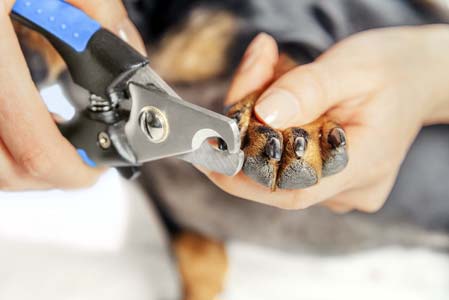There are several dog health problems that could definitely have an effect on labrador retriever training. Indeed, such health conditions could either impede or put a stop to your dog's training progress. Failure to take applicable preventative measures might result to the progression of severe health problems. As they say, prevention is always better than cure. Sad to say, there are numerous dog diseases that are truly inescapable, particularly those conditions that are induced by their parents' genes.
Weight problems, obesity
Most large dogs have big appetites; and so, they have the tendency to suffer from weight problems like obesity. Poor feeding habits and the supply of fattening meals or treats are often the reason why big dogs like the labrador retrievers tend to grow bigger than they're supposed to. Dog owners should always keep in mind the need for discipline, especially when enforcing a strict diet.
Seek the advice of your vet regarding the best kind of diet or the forms of nutrients necessary to boost your labrador's overall health. This way, you can avoid struggling with weight issues, and avert the likelihood of obesity and its complications. Unsurprisingly, an obese labrador is not that productive and easy to train with. You are less likely to accomplish successful labrador retriever training.
Centroneuclear Myopathy or Hereditary Myopathy of Labrador Retrievers (HMLR)
As the name signifies, this muscle defect is hereditary; the affected lab got his disease genes from both his parents regardless whether they've displayed some signs and symptoms or not. This condition is often characterized by the insufficiency of type II muscle fibers that results in the tremendous decrease in skeletal muscle mass. Symptoms consist of an abnormal gait and posture together with weakness in the muscles that often cause low tolerance to vigorous physical exercises and training.
Now this means that your dog is not ideal for intense labrador retriever training activities. However, it doesn't mean that your lab is no longer efficient at doing anything. Sadly though, there is no helpful treatment for such condition. However, rest and proper ways of handling can reduce the pain and it's other symptoms. Take into account that cold and stress should be fended off as your suffering labrador retriever is very susceptible to them.
Exercise Induced Collapse (EIC)
This condition is most rampant in young adult labrador retrievers. This syndrome of exercise intolerance and collapse is passed down or genetic. Several affected dogs are even identified as muscular and fit or healthy. And even though moderate sorts of physical exercises can be tolerated by affected labs, it is wise that you be very cautious and meticulous when executing your labrador retriever training routines. In this manner, you will know when to stop.
Overexertion and extreme enthusiasm often induce weakness in the legs that is then followed by collapse. Almost all affected labradors stay conscious right after collapsing while others become utterly stunned and disoriented. Take note that it's important for you to stop any activities upon display of wobbliness or in-coordination. A number of dogs have perished during training or exercise, and others while they were resting after experiencing such condition.

 Can Dogs Eat Mushrooms
Wild Mushrooms Can Poison Your Dog
Can Dogs Eat Mushrooms
Wild Mushrooms Can Poison Your Dog
 How to Help Your Pets Weather the Cold Winter
How to Help Your Pets Weather the Cold Winter
How to Help Your Pets Weather the Cold Winter
How to Help Your Pets Weather the Cold Winter
 What to Expect Should Your Dog Need Anesthesia
Necessity of Anesthesia
Some veter
What to Expect Should Your Dog Need Anesthesia
Necessity of Anesthesia
Some veter
 What is Posture and Why Should We Care About it?
When we think about the activities
What is Posture and Why Should We Care About it?
When we think about the activities
 How to Trim Dog Nails
Nail Trimming is an Essential Part
How to Trim Dog Nails
Nail Trimming is an Essential Part